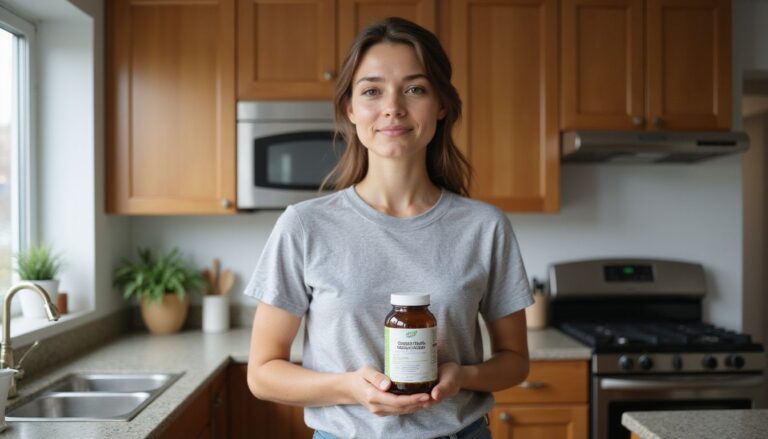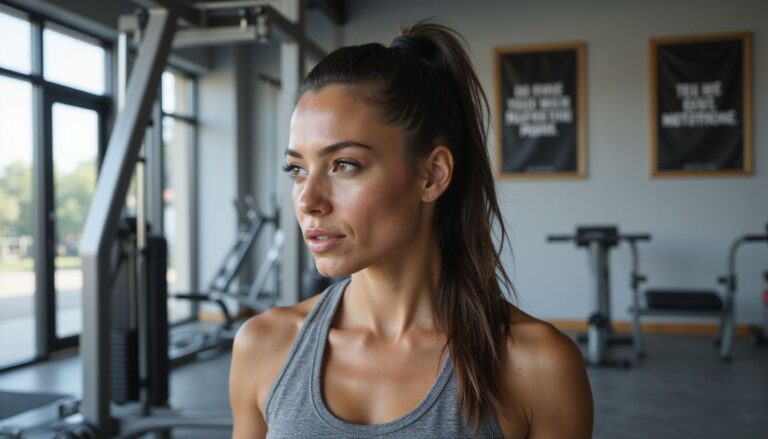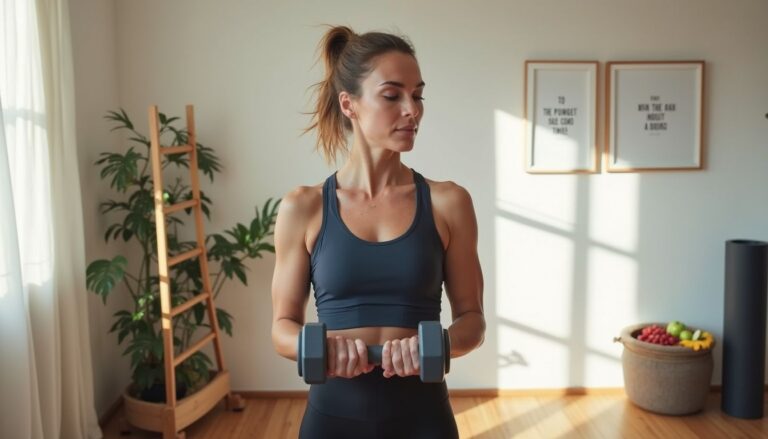Best Food For Hair Growth: Top 5 Foods To Promote Healthy Hair
Our Nutrition Assistant AI Suite will transform your body. You will lose fat, get toned, and build muscle. Gain confidence and optimal health.
If you face hair loss or brittle strands, the right food choices can help. Eating for hair growth means focusing on protein, vitamins, and minerals that feed your scalp and roots.
This guide highlights the top five foods to help promote healthy hair growth and explains how each one supports your follicles. Small shifts at meals can lead to stronger, shinier hair.
Key Takeaways
- Eggs, fatty fish, spinach, sweet potatoes, and avocados rank as top foods for hair growth. They supply protein, biotin, iron, omega-3s, and healthy fats.
- Too little protein can lead to brittle hair or shedding. Eggs provide complete protein; fatty fish like salmon supply omega-3s that calm scalp inflammation.
- Spinach delivers vitamin A for sebum production and iron for oxygen transport to follicles, which can reduce shedding tied to anemia.
- Sweet potatoes are rich in beta-carotene, which your body turns into vitamin A. This supports strong strands and a moisturized scalp with low risk of toxicity from food sources.
- Avocados provide healthy fats plus vitamin E. Together they protect follicles from free radicals and help lock in moisture for thicker-looking hair.
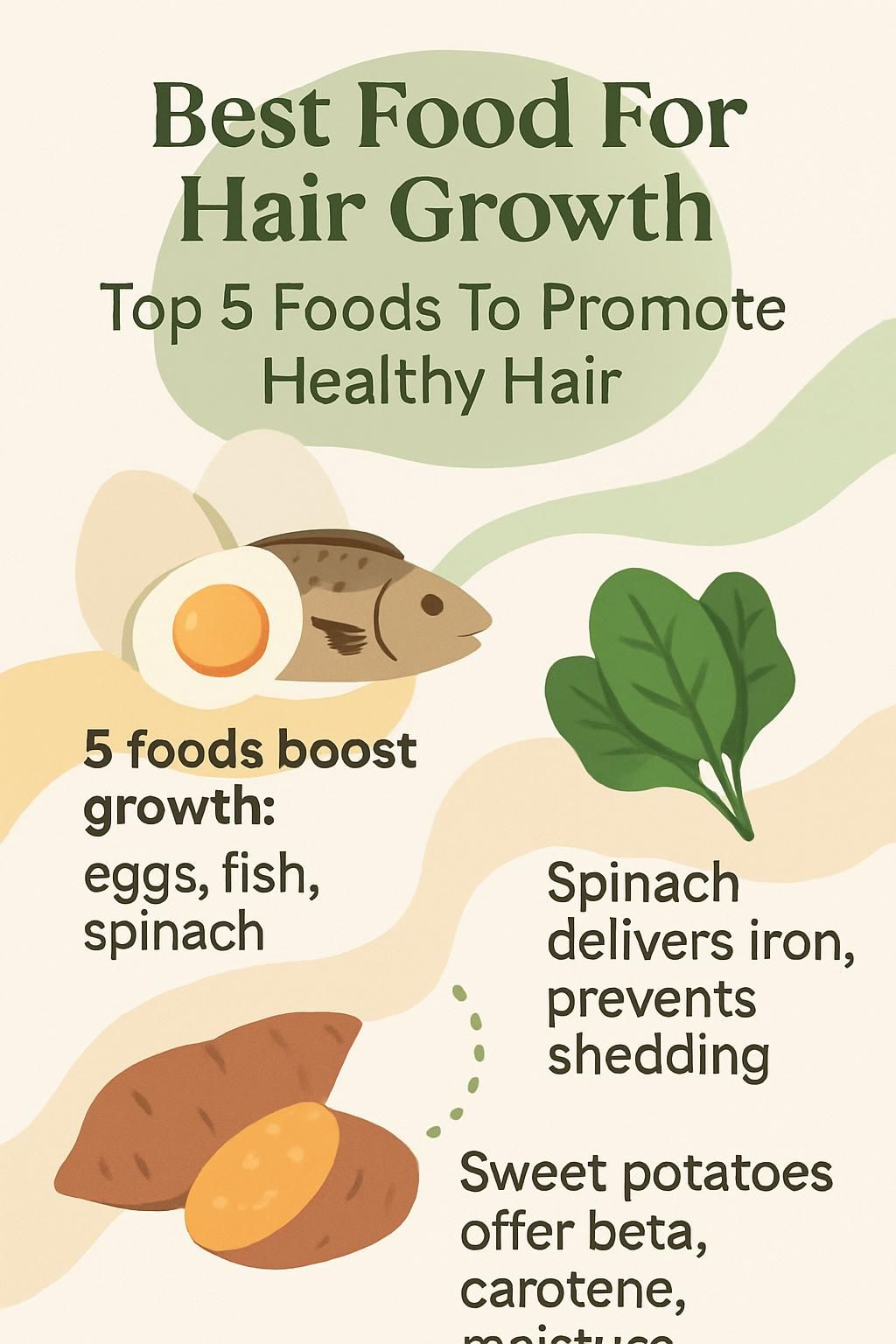
Why Is Nutrition Important for Hair Growth?
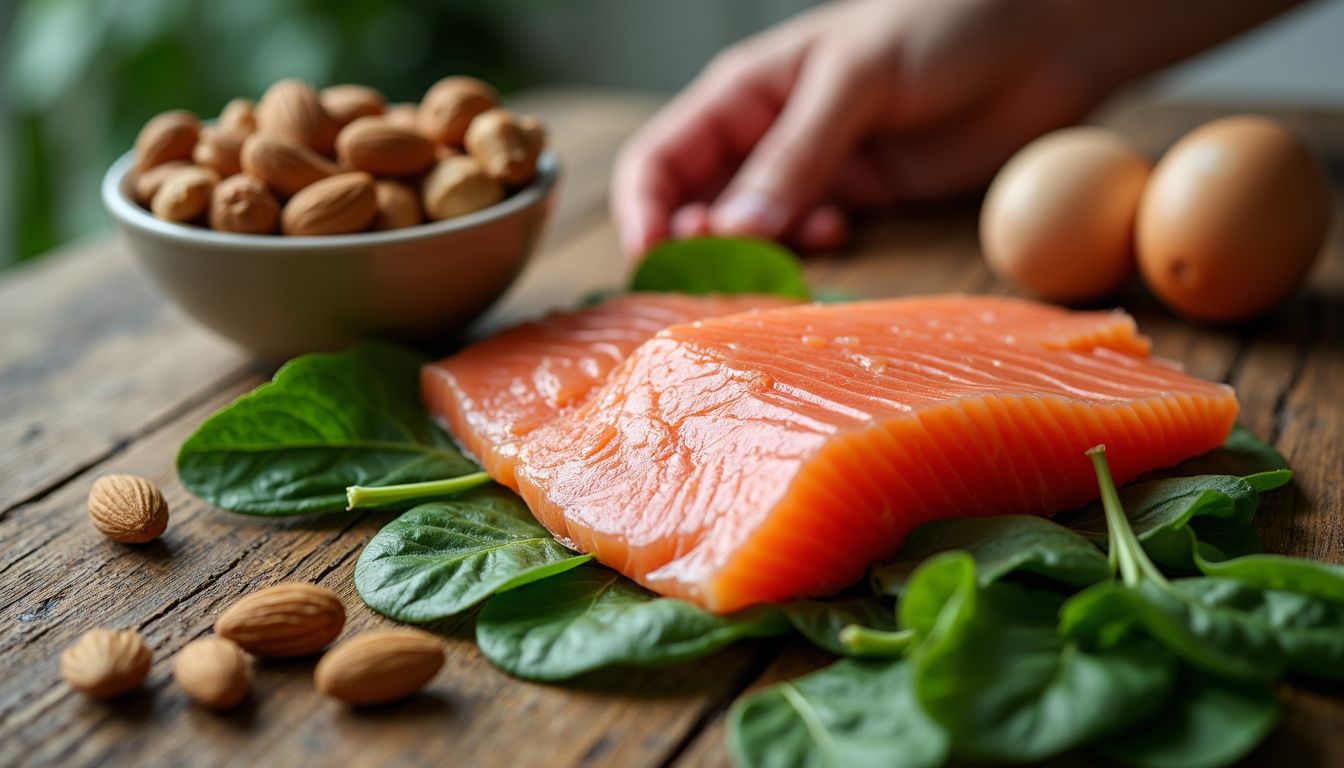
Nutrition directly affects your hair growth and hair quality. Protein, vitamins, and minerals help your scalp, follicles, and the structure of each strand.
How does diet affect hair health?
Your diet powers hair health. Protein, iron, zinc, and vitamins A, C, D, and E help keep follicles strong and reduce restricted growth.
If you miss these nutrients, hair quality often drops. Iron deficiency can cause anemia, which is linked to increased hair shedding.
Hair is primarily made of keratin, a protein. You need enough protein daily to build and repair strands. Omega-3 fatty acids can reduce scalp inflammation that may slow new growth.
Some studies suggest low levels of B vitamins or selenium may raise the risk of poor growth cycles.[1][2]
What you eat fuels your body, and it also fuels the growth and repair of every strand on your head.
Next: see which nutrients matter most for healthy hair.
What are the key nutrients for healthy hair?
Key nutrients include protein, biotin, iron, zinc, vitamins A, C, D, E, omega-3 fatty acids, and folate. Since hair is made of keratin, low protein can lead to brittle strands or slow growth.
Biotin supports keratin production. Iron improves oxygen delivery to your scalp. Zinc helps with cell repair and supports normal oil glands near the roots.
Vitamins A and E protect cells from oxidative stress. Vitamin C supports collagen production, which reinforces hair structure. Omega-3s help hydrate follicles and support scalp health.
Folate assists red blood cell formation, which moves oxygen and nutrients to follicles. A balanced diet that includes these micronutrients helps protect hair and supports steady growth.[1][2]
Eggs: Rich in Protein and Biotin
Eggs are one of the best foods for hair growth. They provide complete protein and biotin, two nutrients linked to strong strands and healthy follicles.
How does protein benefit hair structure?
Protein provides the building blocks your hair needs. Each strand is built from keratin, which your body makes from amino acids found in high protein foods like eggs, poultry, and dairy.
Without enough protein, your body cannot build or repair hair efficiently. That can show up as shedding or thin, weak strands.[1]
One review reported that low protein intake is associated with hair thinning. Hair is made up of more than 90 percent protein,
says Dr. Wilma Bergfeld of the Cleveland Clinic. Eating enough helps prevent breakage and promotes thickness.
[1]
Eating adequate protein supports both hair structure and scalp health.
What role does biotin play in hair growth?
Biotin, a B vitamin, helps your body turn food into energy and supports keratin production. Healthy keratin supports strong strands.
Low biotin can cause brittle hair or hair loss. You may notice stronger hair after adding biotin-rich foods such as eggs, peanuts, and whole grains.[2]
I added egg scrambles several times a week when my hair looked dull. After a month, my nails thickened and my scalp felt less dry.
Fatty Fish: Omega-3s for Scalp Health
Fatty fish supply essential fatty acids that help support hair growth and a calm, hydrated scalp.
What are good fatty fish examples for hair health?
Fish high in omega-3s can nourish your scalp and follicles. Add a few servings each week if possible.
- Salmon is a top source of essential fatty acids that help protect follicles and may reduce shedding.
- Mackerel provides protein, vitamin D, and omega-3s that support growth and scalp comfort.
- Sardines supply omega-3s and vitamin B12, which may help strengthen hair.
- Herring offers protein and vitamin D, both tied to healthy hair and skin.
- Trout contains selenium, vitamin B6, and essential fats that support normal cell function for growth.
Eating salmon twice a week kept my scalp more comfortable in winter, and my hair looked less brittle.
How do omega-3 fatty acids affect hair follicles?
Omega-3s help calm scalp inflammation and support good blood flow. That can keep follicles healthy and may help hair look thicker.
These fats also support the sebaceous glands, which produce oil that keeps the scalp hydrated. People with hair loss often eat few omega-3s. Including more fatty fish can support a healthier scalp environment.[3]
Spinach: Packed with Vitamins and Iron
Spinach provides several vitamins and iron that support hair growth. Better oxygen delivery keeps follicles strong and active.
How does vitamin A support sebum production?
Vitamin A supports sebum, the natural oil that moisturizes your scalp. Oil from sebaceous glands keeps hair and skin comfortable.
Too little vitamin A can slow sebum production. That may leave the scalp dry or flaky. Vitamin A also supports normal immune function in skin cells, which helps defend follicles.
Vegetables rich in beta-carotene, such as carrots and sweet potatoes, help your body make vitamin A safely from plants.
Why is iron important for oxygen delivery to hair follicles?
Iron helps form hemoglobin, the protein in red blood cells that carries oxygen to tissues, including hair follicles.
Low iron means less oxygen reaches each follicle, which may lead to shedding or slow growth. Spinach, red meat, beans, and lentils are good iron sources.
My shedding slowed after my clinician found low iron and suggested more leafy greens. Getting enough iron can support growth if thin hair is linked to low intake.[1]
Sweet Potatoes: Beta-Carotene for Hair Growth
Sweet potatoes are rich in beta-carotene. Your body converts it to vitamin A, which supports the scalp and helps hair stay strong.
How does beta-carotene convert to vitamin A?
After you eat orange vegetables like sweet potatoes or carrots, your small intestine absorbs beta-carotene. Enzymes split it into retinol, a usable form of vitamin A.
This vitamin supports follicle growth and healthy skin cells on the scalp. Plant sources are safe because your body converts only what it needs.
What are the benefits of vitamin A for hair thickness and strength?
Vitamin A supports sebum production, which moisturizes your scalp and protects strands. Well-conditioned hair breaks less often.
People who eat vitamin A rich vegetables often report hair that feels stronger and looks thicker. Low intake can leave strands brittle.
My own hair felt less prone to split ends after I added spinach and sweet potatoes to weekly meals.
Avocados: Healthy Fats and Antioxidants
Avocados provide healthy fats that help hair hold moisture. They also deliver antioxidants that protect the scalp from damage by free radicals, which are unstable molecules.
How does vitamin E protect and repair hair follicles?
Vitamin E is a strong antioxidant. It helps protect follicles from free radical damage and supports a healthy balance between oxidation and repair, often called redox balance.
It also supports healthy blood flow to the scalp. Nuts, seeds, and avocados are good food sources. During dry months, adding these foods helped ease my itchy scalp within two weeks.
Vitamin E supports moisture around follicles and new cell growth, which can help hair grow stronger over time.[2]
Why are healthy fats important for hair moisture?
Healthy fats support the cell membranes that surround each hair. Strong membranes hold water better, so hair stays soft and shiny.
Avocados, nuts, seeds, and fatty fish supply these fats. If your hair feels dry from dieting or low fat eating, adding these foods can help restore balance.
Nuts and Seeds: A Nutrient Powerhouse
Nuts and seeds deliver minerals and vitamins that support growth and strength. They can also lower the chance of zinc deficiency, which may cause thinning.
What are some nuts and seeds good for hair?
Mix several options to cover more nutrients and support scalp health.
- Almonds supply vitamin E, which helps shield follicles from everyday oxidative stress.
- Walnuts offer omega-3 fatty acids that calm scalp inflammation and nourish follicles.
- Sunflower seeds are a helpful source of zinc, a mineral linked to healthy roots.
- Pumpkin seeds provide iron and zinc that support oxygen delivery and hair strength.
- Flaxseeds contain plant-based omega-3s, useful for people who eat vegetarian or vegan diets.
- Chia seeds deliver protein, fiber, antioxidants, and minerals that support shine and normal cycles.
- Brazil nuts supply selenium, which supports normal thyroid function that influences hair patterns.
Eating a variety improves your chances of getting enough key nutrients for growth and hair loss prevention.
How do vitamin E, zinc, and omega-3s support hair health?
Vitamin E acts as an antioxidant that protects follicles and may improve scalp blood flow. Better blood flow brings more oxygen and nutrients.
Zinc supports oil glands near hair roots and keeps normal growth cycles on track. Low zinc can weaken follicles and raise the risk of shedding.
Omega-3s hydrate the scalp and reduce inflammatory triggers. Foods like walnuts, flaxseeds, chia seeds, and fish can support strands from root to tip.
Healthy levels of these nutrients can lead to smoother shafts and fewer split ends.[2][3]
Berries: High in Antioxidants and Vitamin C
Berries pack antioxidants that help guard hair and scalp. Adding mixed berries to meals is an easy nutrition win.
How does vitamin C help with collagen production?
Vitamin C helps your body make collagen, a protein that supports hair and skin. It assists enzymes that build collagen fibers from amino acids.
Low vitamin C can weaken roots and reduce elasticity. Strawberries, oranges, kiwi, and bell peppers are practical ways to boost intake.
How do antioxidants protect hair from free radicals?
Antioxidants neutralize free radicals, which can damage cells in hair and scalp. Stress, pollution, and poor diet can raise free radical levels.
Berries, nuts, spinach, and avocados can lower oxidative stress on follicles. Vitamin C also supports collagen for stronger shafts. Regular intake helps create a healthy setting for steady growth.[2]
Meat: Protein and Iron for Hair Strength
Meat provides high quality protein and heme iron, which your body absorbs easily. Both nutrients support strong hair.
How do lean meats prevent hair thinning?
Lean meats like chicken and turkey supply complete protein. Your body uses these amino acids to build keratin, the fiber that gives hair strength and flexibility.
Iron in lean meat improves oxygen delivery to follicles. Low iron can trigger shedding or diffuse thinning. A 100 gram serving of cooked chicken breast provides about 0.9 milligrams of iron.
Including lean meats can help you meet daily protein and iron targets.[1]
Which iron-rich meats improve oxygen supply to hair?
Beef and chicken liver are rich in heme iron that your body absorbs well. A 3 ounce serving of beef liver provides about 5 milligrams of iron.
Turkey, pork loin, and lean ground beef also add iron and protein. These foods support healthy blood flow to hair roots and steady nutrient delivery. During a stressful semester, eating more red meat seemed to improve my scalp comfort.
Choose cuts lower in saturated fat to support heart health and hair needs.
Beans and Lentils: A Plant-Based Protein Option
Beans and lentils offer budget-friendly protein plus minerals that support hair growth. Many people use them to raise iron and folate intake.
Why is folate important for hair follicle health?
Folate, or vitamin B9, supports new cell production, including cells inside hair follicles. It also helps form red blood cells that carry oxygen and nutrients to roots.
Too little folate can slow growth and increase thinning. Foods high in folate keep cell turnover steady so your scalp gets consistent nourishment.
Pair iron rich plant foods with folate sources to further support oxygen delivery to each follicle.[2]
What makes beans and lentils affordable protein sources?
Beans and lentils usually cost less per gram of protein than meat or fish. Buying dried legumes in bulk saves money and reduces waste since they store well.
They provide about 15 to 18 grams of protein per cooked cup, plus iron, zinc, and folate. In college, I relied on canned black beans. My hair felt stronger after several weeks of steady plant protein.
Oysters: Zinc for Hair Repair and Growth
Oysters are one of the most concentrated food sources of zinc. This mineral supports repair and normal growth in follicles.
Why is zinc essential for hair follicle recovery?
Zinc supports cell repair and fast cell turnover in the scalp. Lack of zinc is linked with telogen effluvium, a temporary shedding pattern tied to stress or poor nutrition.
Zinc also supports keratin structure and immune function, which can lower inflammation near follicles. I increased pumpkin seeds and cashews after slow regrowth one season and noticed steady progress over time.[2][3]
How do oysters provide concentrated zinc?
Oysters deliver very high amounts of zinc per serving. Six medium oysters can provide more than triple your daily zinc need.
Your body uses zinc to repair follicles and support new growth. If you deal with brittle or thinning hair, oysters can be a targeted way to raise zinc intake through food.
Tips for Supporting Hair Growth Through Diet
Daily habits carry a lot of weight. These steps help create a healthy base for your scalp and hair.
Why is hydration important for scalp health?
Water helps your scalp maintain balanced oil, which keeps skin and hair comfortable. Too little water can leave the scalp tight, itchy, or flaky.
Hydrated scalp skin moves nutrients more easily to follicles. Aim for at least eight cups per day, more with heat or exercise. When I raised my water intake, itch and dryness eased within a week.
What are the risks of over-supplementing vitamins?
Too many supplements can cause imbalances and toxicity. Excess vitamin A can trigger hair loss, even though it supports oil production.
High iron from pills can strain organs and block other nutrients. Large doses of single minerals may also reduce absorption of others. I once tried extra B vitamins without guidance and ended up with headaches. Food first is the safer path unless a clinician advises otherwise.[2][3]
How does a balanced diet support long-term hair growth?
A balanced diet supplies what hair needs over time. Fruits and vegetables give vitamins A, C, D, and E. Lean meats or legumes provide protein and iron. Zinc comes from seafood, meats, beans, and seeds.
Protein builds keratin. Healthy fats from avocados, nuts, seeds, and fish keep the scalp hydrated. After I added mixed nuts weekly, I noticed less shedding while brushing. Hydration ties it all together for steady progress.
Frequently Asked Questions about Hair Growth and Diet
Here are clear answers to common questions about diet and hair health.
Can eating certain foods make hair grow faster?
Food supports the growth cycle by providing protein, biotin, iron, zinc, and vitamins. Eggs deliver complete protein and biotin. Fatty fish such as salmon provide omega-3s that support the scalp.
Spinach adds vitamin A and iron to help oxygen reach follicles. Oysters supply zinc for repair. Avocados offer vitamin E for antioxidant protection. People low in these nutrients often see slower growth.[1][2][3]
Focus on whole foods to support circulation at the roots and protect follicles from oxidative stress.
Is a vegetarian diet effective for hair growth?
Yes, if you plan for key nutrients. Use beans, lentils, soy foods, nuts, and seeds for protein. Spinach and legumes add iron for better oxygen delivery.
Vitamin B12 is scarce in plants, so consider fortified foods or a clinician guided supplement. Include zinc and omega-3 sources, such as pumpkin seeds, chia seeds, and walnuts, to support follicles and reduce stress on cells.
What role does hydration play in maintaining hair health?
Water supports scalp hydration and helps carry nutrients to hair roots. Low intake can show up as a dry scalp and brittle strands.
During summer, I raised my daily water to about eight cups. Within two weeks, my hair felt softer and looked shinier. Keep a bottle near you to make consistent sips easier.
Conclusion
Healthy hair starts in your kitchen. Adding eggs, fatty fish, spinach, sweet potatoes, and avocados can support hair growth with protein, iron, omega-3s, vitamin A, and healthy fats.
These nutrient rich foods help your body handle oxidative stress and keep strands strong from root to tip. If you notice sudden shedding or patchy hair loss, talk with a dermatologist or your primary care clinician. This article provides general information, not medical advice.[3]
Choose whole foods most of the time. With steady habits, you can support thicker, shinier, and healthier hair.
References: [1] Cleveland Clinic, nutrition and hair insights. [2] National Institutes of Health, Office of Dietary Supplements, nutrient fact sheets. [3] American Academy of Dermatology, guidance on hair loss and nutrition.
FAQs
1. Which nutrients in food help promote healthy hair growth?
Protein, iron, zinc, and vitamins such as A, C, D, and E are vital for strong hair. These nutrients support the structure of each strand and improve scalp health. Minerals like selenium and magnesium also play a role in reducing stress on follicles.
2. How does diet affect hair strength and thickness?
A balanced diet rich in minerals and antioxidants helps protect cells from radical damage caused by oxidative stress. Consuming foods high in these nutrients can reduce breakage and encourage thicker strands over time.
3. What are examples of top foods that support hair health?
Salmon provides omega-3 fatty acids; eggs offer protein and biotin; spinach supplies iron; sweet potatoes contain beta-carotene; nuts deliver vitamin E. Each food contains key minerals or vitamins linked to improved nutrition for growing stronger hair.
4. Can managing biological stress through nutrition impact hair loss?
Eating nutrient-dense meals with enough minerals may lower biological stress levels that contribute to shedding or thinning strands. Studies show diets lacking essential nutrients increase vulnerability to radical damage at the cellular level which affects follicle function.
Summary: Nutrient-rich foods supply protein, vitamins, minerals, and antioxidants needed for optimal growth while protecting against radical-induced cell damage from stress factors found in daily life or poor dietary choices.[1][2] Personal experience shows consistent intake of these foods leads to visible improvements within several months.
—
[1] Harvard T.H Chan School of Public Health: The Nutrition Source
[2] National Institutes of Health: Office of Dietary Supplements


